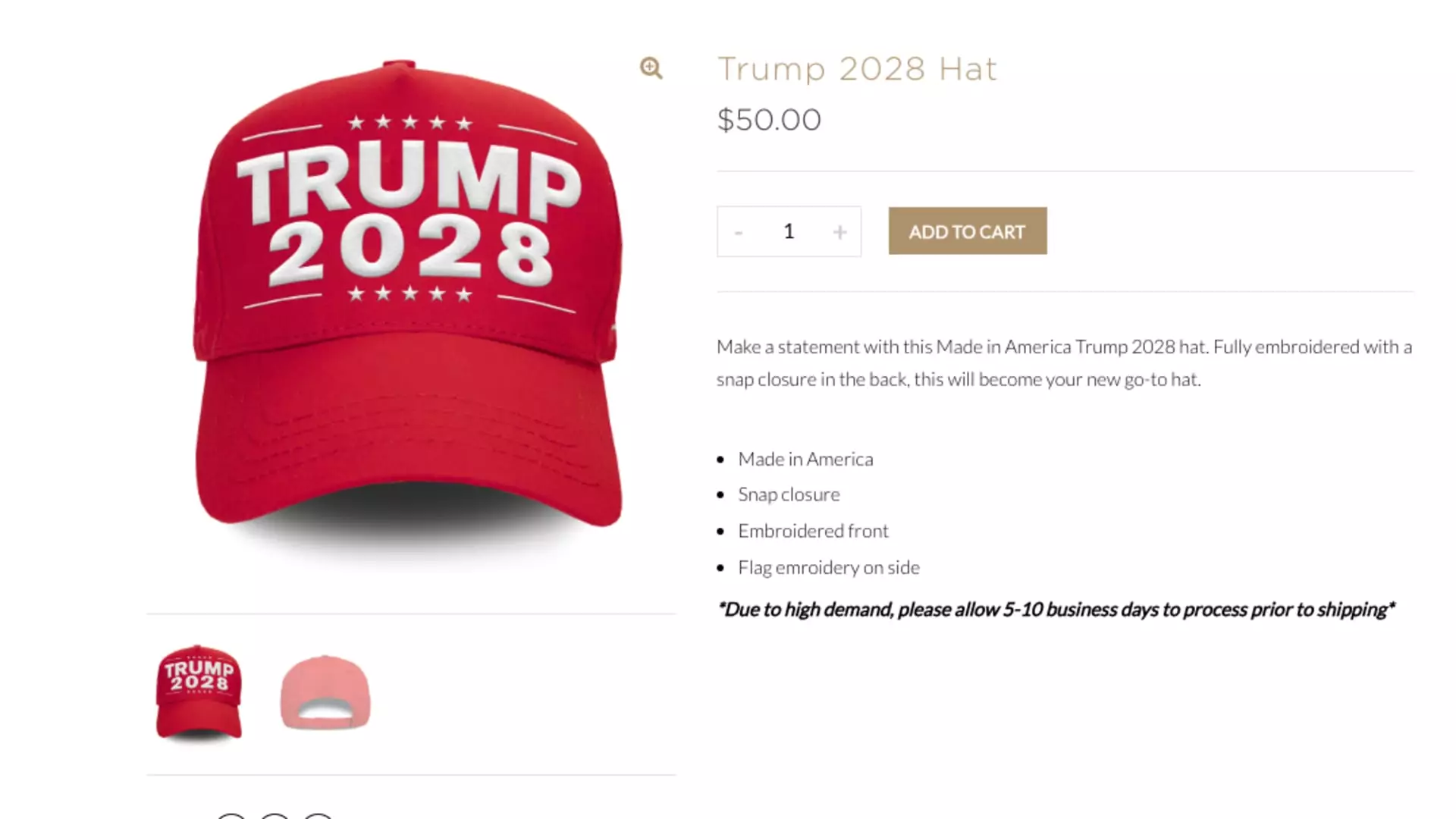Recent events have unveiled a tantalizing and somewhat alarming twist in American political life. The Trump Organization’s online store has initiated an aggressive merchandising campaign with hats and t-shirts emblazoned with “Trump 2028.” While at first glance it might appear to be just another marketing ploy from an entity known for its brashness, this move indicates a deeper and unsettling intention—fueling speculation about former President Donald Trump’s aspirations for a third term in the Oval Office. The merchandising strategy raises questions about the implications of such ambitions, especially considering the constitutional barriers that are theoretically in place to prevent him from doing so.
The White House spokesperson’s response—“But it’s a cool hat”—is emblematic of a concerning downplaying of serious constitutional concerns. The casual endorsement of Trump’s future ambitions in mere fashion speaks volumes about the normalization of contentious political posturing. One has to wonder if a simple hat should hold so much power; it trivializes the foundational legal framework that governs how many times one can hold the presidency in this country.
The Constitutional Reality Check
According to the 22nd Amendment of the U.S. Constitution, which explicitly impedes any individual from being elected president more than twice, Trump’s candidacy for a third term raises significant legal concerns. The ramifications of altering this amendment are profound, as it would challenge the essence of democratic principles and set a dangerous precedent for future leadership in the United States. Trump’s flirtation with the notion of rewriting the rules for his benefit should strike fear into the hearts of serious political thinkers and citizens alike.
Trump’s own comments suggest a problematic attitude towards the limitations that define the presidency. “There are methods which you could do it,” he mentioned, hinting at the idea of amending the Constitution for personal gain. Such statements are not just lighthearted banter; they reflect a dangerous mindset—that power can be manipulated and reshaped to suit individual desires. It undermines the very system that ensures democracy is upheld, and politicians are held accountable to the electorate.
Supporters and Enablers: The Echo Chamber of Entitlement
The backing Trump receives from figures like former advisor Steve Bannon only amplifies the gravity of this situation. “President Trump is going to run for a third term,” Bannon proclaimed with certainty, illustrating the strong echo chamber that surrounds Trump. Their conviction isn’t rooted in democratic principles or the sanctity of the Constitution, but rather in a desire for power and control that transcends norms. This dynamic creates an environment where rules can be bent and democracies can teeter on the edge of autocratic rule, which many observers fear could be the next inevitable step.
The resolution introduced by Rep. Andy Ogles, aimed specifically to allow Trump a third term while excluding other living presidents, is emblematic of a worrying trend towards selective constitutionalism. It creates an atmosphere where exceptions are made based on favoritism rather than fairness and equity, fundamentally altering the landscape of American governance. This chilling proposal should raise alarm bells, igniting critical conversations about what constitutes legitimate leadership in the U.S.
An Examination of Voter Sentiment
Despite the seemingly absurd nature of Trump’s teaser campaign for 2028, it’s essential to reflect on the sentiments of his supporters. Trump’s base continues to resonate with the notion of breaking barriers and rewriting norms, demonstrating an appeal that shifts the political landscape towards a form of populism that thrives on disruption rather than stability. This sociopolitical phenomenon is concerning for those who value a semblance of order and predictability in leadership, especially in an ever-divisive political climate.
For many, Trump serves as a symbol of anti-establishment fervor, but at what cost? The risks associated with trading off democratic values for fleeting popularity could spell disaster for the foundations of governance in America. The allure of a third term isn’t merely an exercise in vanity for Trump; it could signify a wider and darker trend—one where the sentiment of the populace is overtaken by the machinations of self-serving leaders who value personal ambition over collective responsibility.
In this complex web of intrigue, the implications are far-reaching, and it is crucial for citizens and lawmakers alike to remain vigilant. What began as a simple merchandising campaign has transformed into a conversation about ambition, entitlement, and the very essence of democracy itself.


Leave a Reply